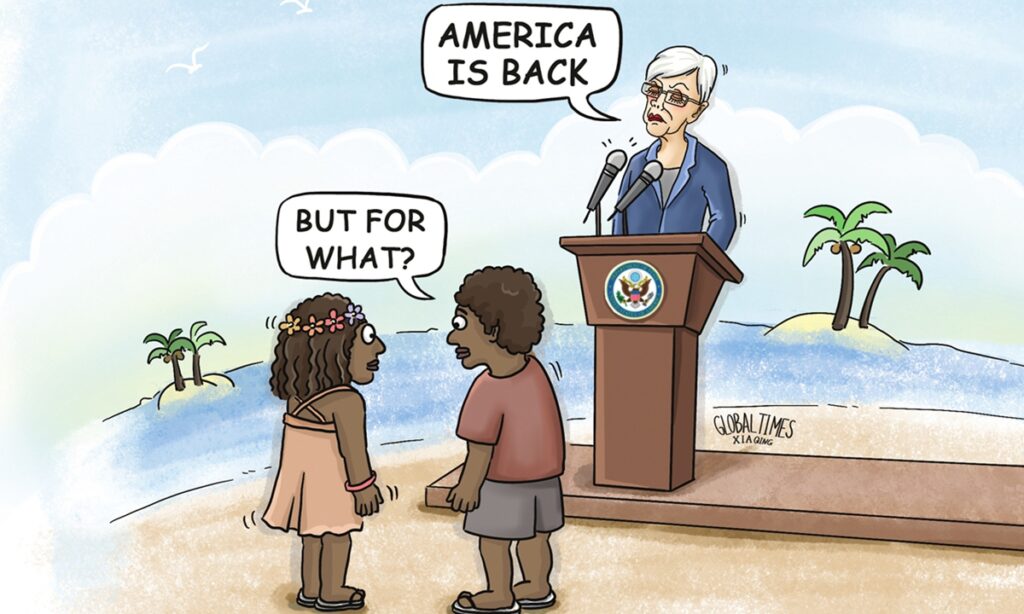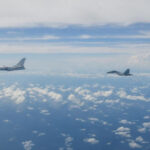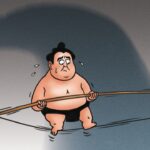US President Joe Biden will host Pacific island leaders at the White House for a meeting in September, a senior US diplomat said on Saturday, according to a South China Morning Post report. This was confirmed by Deputy Secretary of State Wendy Sherman, who was visiting the region.
Since coming to power, Biden convened several regional summits at home, especially those with developing countries and regions, including the ASEAN-US Special Summit 2022 – delayed twice and criticized for lack of “sincerity and actions,” and the Summit of the Americas, which multiple Latin American leaders threatened to boycott.
Moreover, a US-Africa summit is expected to be held in Washington in December, one of the US efforts to reinforce its so-called global influence, together with the upcoming summit with Pacific island leaders in September. But these US-hosted summits have something in common: They are high-profile but with limited results, with many of them meeting with opposition and cynicism from the countries concerned.
The Biden administration is pursuing an alignment strategy, mainly through this kind of summits to draw close relations with countries around the world which have established partnerships with China, in order to hedge China’s influence. In the September meeting with the Pacific island countries, the most likely topics to be covered are climate change and development assistance, the topics of greatest concern to regional countries. However, it remains questionable how much resources the US will be able to contribute in this regard.
Washington has long paid little attention to this region, where some countries have not even seen US ambassadors or engagement over the past decades. Xu Liping, a research fellow on Southeast Asian studies at the Chinese Academy of Social Sciences in Beijing, told the Global Times that development assistance is not an advantage of the US in developing relations with these countries, as it mainly gains benefits by creating confrontation and contradiction in the region by playing the security card. For the development issues the Pacific island countries desire to address, the actual moves that the US has made and may make in the future could be very limited.
Late in June, G7 leaders pledged to mobilize $600 billion to fund the “Partnership for Global Infrastructure and Investment” project in developing countries. But Xu believes that it will be difficult for the G7 countries to raise enough money as the proposed funding would depend largely on private companies and is therefore not guaranteed since the companies would not be interested if the project is regarded to be unprofitable or is supposed to take too long.
Solomon Islands police and security minister Anthony Veke welcomed the US “re-engagement” with the country and the region. But he called on Washington to launch a “scaled-up effort” to remove unexploded World War II ordnance that continues to injure and kill Solomon Islanders to this day, AFP reported. It should be said that all forces that can bring peace and security development to the Pacific are welcomed. But the US certainly has no plan to change its roadmap for a monopolistic approach to sidelining China, something that all regional countries should be wary of.
Between the mid-1940s and early 1960s, the Marshall Islands were known as the Pacific Proving Grounds due to the nuclear tests conducted at various sites in the islands, seriously affecting the health of the local population and permanently damaging the environment. China actively welcomes the environmental remedial measures from the US to mitigate the effects of nuclear testing and remove the WWII ordnance.
Unfortunately, the vast majority of US engagements with developing countries, including the Pacific island countries, aim strongly at containing China, noted Xu. “So it’s uncertain whether the US will take pragmatic measures to benefit the regional people, and regional countries that have long been snubbed by Washington are quite conscious of this. As a result, it’s hard for them to actively cooperate with the US and form a gang to counter China, or trap themselves in a dilemma of choosing sides.”
The need of independence and autonomy in the Pacific island region is growing. For the development of regional countries, healthy and virtuous cooperation has to be based on regional countries’ own needs, such as infrastructure, poverty reduction, food and energy, rather than imposing on the region the security issues claimed by the US and its allies. Regional countries are unlikely to accept the security proposals, which bring no fundamental benefit to the region. The summit in Washington convening Pacific island leaders could be another farce without any valuable achievement.
(Global Times)




